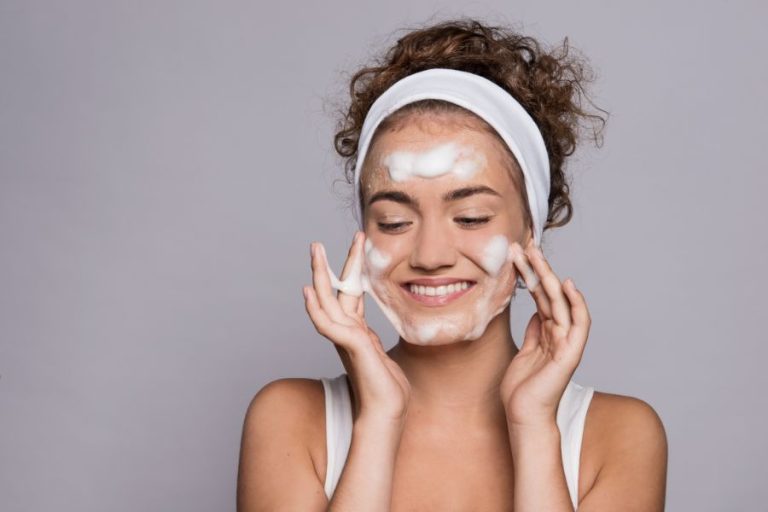As the winter season approaches, it’s crucial to adapt your skincare routine to combat the harsh effects of cold weather. A well-thought-out winter skincare routine can help maintain glowing, healthy skin throughout the season. Whether you’re at home or on the go, these tips will guide you through creating an effective skincare regimen suitable for different skin types.
Winter Skincare Routine

Winter Skincare Routine for Glowing Skin
The key to maintaining a radiant complexion in winter lies in hydration and protection. Start your routine with a gentle, hydrating cleanser, followed by a rich moisturizer. Incorporating a hydrating serum or face oil can provide an extra glow. Weekly exfoliation helps remove dead skin cells, revealing a brighter skin tone.
At-Home Winter Skin Care Routine
Crafting a winter skincare routine at home allows you to use natural and homemade products. For instance, masks made from honey or yoghurt are excellent for hydrating the skin. A DIY oatmeal scrub can gently exfoliate without stripping away moisture.
Winter Skincare Routine for Dry Skin
If you have dry skin, winter can be particularly challenging. Opt for cream-based cleansers and alcohol-free toners. Your moisturiser should be thick and contain ingredients like hyaluronic acid or glycerin. Overnight treatments, like sleeping masks or oil-based serums, can work wonders for intense hydration.
Homemade Winter Skin Care Routine for Dry Skin
For those who prefer homemade solutions, creating a winter skincare routine with natural ingredients can be effective. Avocado masks, almond oil, and shea butter are great for nourishing dry skin. Homemade sugar scrubs with olive oil can gently exfoliate without drying the skin.
Winter Skincare for Oily Skin
Managing oily skin in the winter requires a balance between removing excess oil and maintaining hydration. Use a lightweight, water-bamoisturiser to avoid clogging pores. A gentle exfoliating cleanser can help control oil production while keeping the skin hydrated.
Conclusion
Adapting your skincare routine for winter is essential for keeping your skin healthy and glowing, regardless of your skin type. Whether you’re using store-bought products or homemade remedies, the focus should be on hydration and gentle care. By following these tailored routines, you can ensure your skin stays nourished and radiant throughout the winter season.
FAQ
What skincare products do I need for winter?
Moisturiser: A thicker, more hydrating moisturiser to combat dryness.
Gentle Cleanser: A hydrating, non-stripping cleanser.
Lip Balm: A nourishing lip balm to prevent and treat chapped lips.
Serum: A hydrating serum, preferably with hyaluronic acid, to layer under your moisturiser.
Sunscreen: Broad-spectrum sunscreen to protect against UV rays, even on cloudy winter days.
Body Lotion: A rich body lotion or cream to keep your body’s skin hydrated.
Hand Cream: A moisturising hand cream, as hands often get dry in winter.
What is good for skin in the winter?
Hydration: Products that hydrate and lock in moisture are essential.
Protection: using products that protect the skin barrier from the harsh winter elements.
Gentle Exfoliation: To remove dead skin cells without stripping moisture.
Diet and Hydration: Consuming a balanced diet rich in omega-3 fatty acids and drinking plenty of water.
Humidifiers: Using a humidifier to add moisture to the dry indoor air.
What is a winter skin care routine?
A typical winter skincare routine involves the following:
Morning:
Gentle cleansing
Hydrating serum
Moisturizer
Sunscreen
Evening:
Gentle cleansing
Hydrating serum or treatment
Rich moisturiser or night cream
Occasional use of a hydrating mask or oil-based serum for extra nourishment.
Weekly:
Gentle exfoliation to remove dead skin cells.
What skincare ingredients are best for winter skin?
Hyaluronic Acid: For deep hydration.
Ceramides: To strengthen the skin barrier.
Glycerin : A humectant that draws moisture into the skin.
Niacinamide: For its barrier-repair and anti-inflammatory properties.
Peptides: For skin repair and hydration.
Natural oils: Such as jojoba, almond, or avocado oil, for nourishment.
Shea Butter: A rich emollient, great for body lotions and creams.
For More Visit: https://cutebeauty.co.uk/

